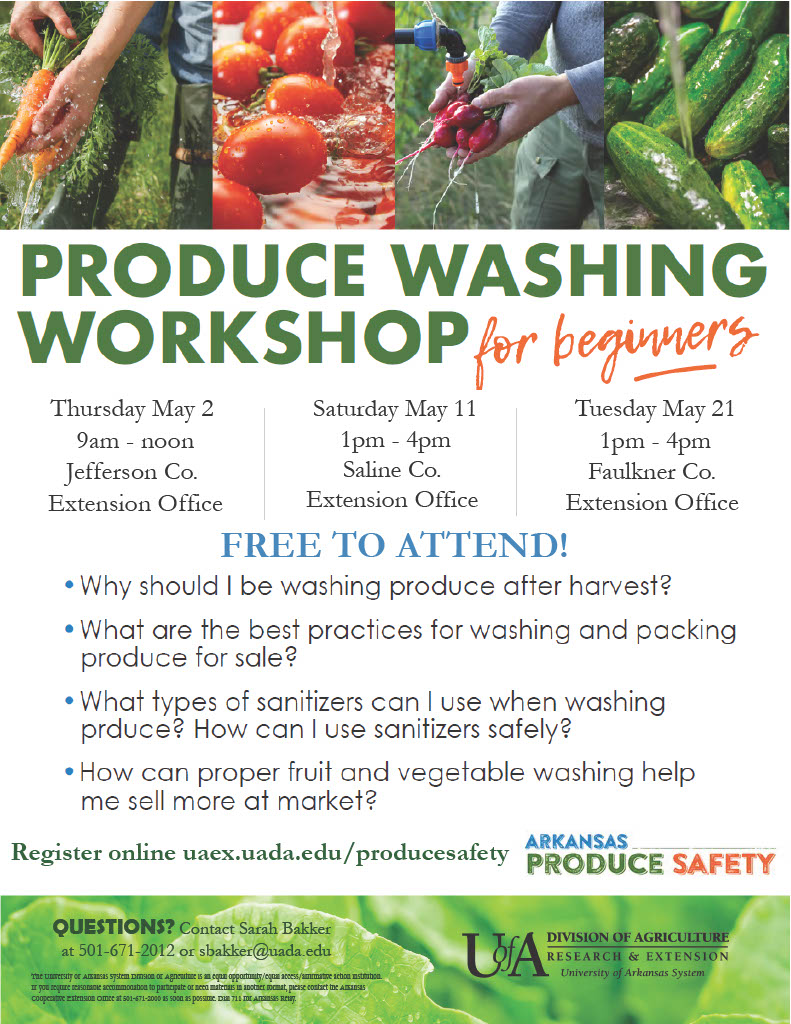Cooperative Extension Service to offer three produce washing workshops in May
By Rebekah Hall
U of A System Division of Agriculture
April 15, 2024
Fast Facts:
- Free workshops geared toward small-scale farmers, backyard gardeners
- Content will cover washing and packing best practices, types of wash systems, choosing sanitizers and more
- Register at bit.ly/ar-produce-washing
(466 words)
(Newsrooms: With graphic)
LITTLE ROCK — For small-scale farmers and backyard gardeners interested in improving their fruit and vegetable washing and handling practices, the Cooperative Extension Service will offer three no-cost produce washing workshops in May. These workshops for beginners will cover best practices, types of wash systems and more.
Each three-hour workshop will give participants a better understanding of why produce safety is important on smaller operations, what types of wash systems are appropriate for certain crops and how to choose the correct sanitizer and use it properly. The workshops will also feature a basic wash-and-pack system that participants can recreate in their own backyards.
“These workshops will help to demystify some of the questions new growers may have about produce safety,” said Sarah Bakker, extension program associate for Arkansas Local, Regional and Safe Foods for the University of Arkansas System Division of Agriculture. “No one wants to make people sick from the produce they grow, and we want to help those smaller growers to create systems for washing and packing that are practical, efficient and safe.”
Bakker said farmers market vendors, homesteaders wanting to serve safe produce to their families, and gardeners who share their produce with friends and neighbors are ideal participants for these workshops.
“We will have a basic wash-and-pack system set up for participants to see how easy it is to create your own ‘pack shed,’ even when you don’t have space for it,” Bakker said. “We will also be doing hands-on activities to demonstrate how to easily incorporate sanitizer into your system.”
There is no cost to participants, but they must register for each workshop. Register for each workshop and learn more at bit.ly/ar-produce-washing.
Produce Washing Workshops schedule:
May 2: 9 a.m.-12 p.m. at the Jefferson County Extension Office in Pine Bluff
May 11: 1 p.m.-4 p.m. at the Saline County Extension Office in Benton
May 21: 1 p.m.-4 p.m. at the Faulkner County Extension Office in Conway
The produce washing workshops serve a different purpose and audience than the Produce Safety Grower Trainings also offered by the Cooperative Extension Service. Those trainings are targeted to commercial growers and are a requirement through the U.S. Food and Drug Administration’s Food Safety Modernization Act, or FSMA, Produce Safety Rule.
“I have noticed increased interest in beginner vegetable gardening and small-scale farming to sell at local markets, especially since the beginning of the pandemic,” said Amanda Philyaw Perez, extension associate professor of food systems and food safety specialist for the Division of Agriculture. “While our programs have mostly focused on educating commercial growers to date, I am looking forward to bringing information about produce safety to this new cohort of Arkansas growers.”
For more information about the produce washing workshops, contact Sarah Bakker at sbakker@uada.edu or 501-671-2012. For more information about Arkansas produce safety, visit uaex.uada.edu/farm-ranch/crops-commercial-horticulture/horticulture/arkansas-produce-safety/.
To learn about extension programs in Arkansas, contact your local Cooperative Extension Service agent or visit www.uaex.uada.edu. Follow us on X and Instagram at @AR_Extension. To learn more about Division of Agriculture research, visit the Arkansas Agricultural Experiment Station website: https://aaes.uada.edu. Follow on X at @ArkAgResearch. To learn more about the Division of Agriculture, visit https://uada.edu/. Follow us on X at @AgInArk.
About the Division of Agriculture
The University of Arkansas System Division of Agriculture’s mission is to strengthen agriculture, communities, and families by connecting trusted research to the adoption of best practices. Through the Agricultural Experiment Station and the Cooperative Extension Service, the Division of Agriculture conducts research and extension work within the nation’s historic land grant education system.
The Division of Agriculture is one of 20 entities within the University of Arkansas System. It has offices in all 75 counties in Arkansas and faculty on five system campuses.
The University of Arkansas System Division of Agriculture offers all its Extension and Research programs to all eligible persons without regard to race, color, sex, gender identity, sexual orientation, national origin, religion, age, disability, marital or veteran status, genetic information, or any other legally protected status, and is an Affirmative Action/Equal Opportunity Employer.
# # #
Media Contact:
Rebekah Hall
rkhall@uada.edu
@RKHall_
501-671-2061
